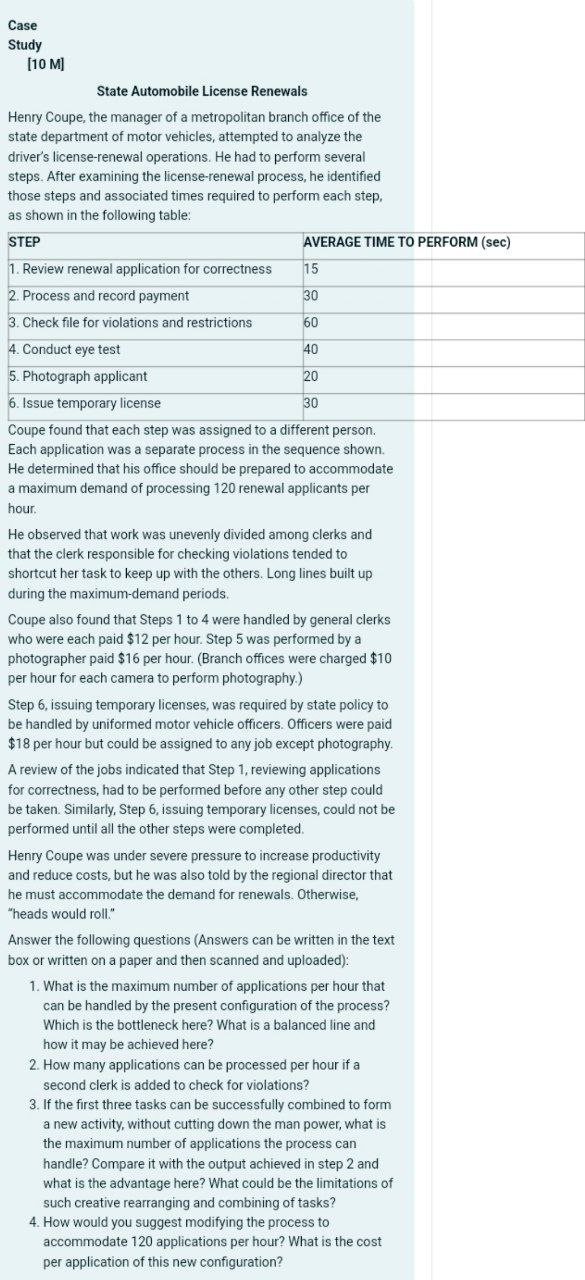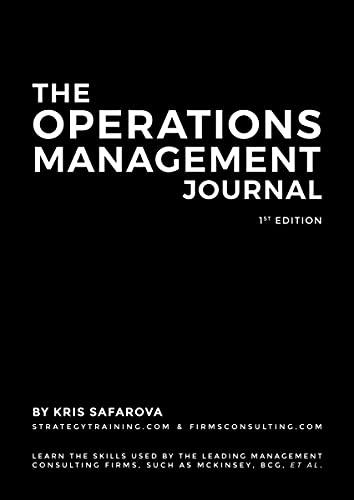Answered step by step
Verified Expert Solution
Question
1 Approved Answer
Question Q 1 I ) What is the maximum number of applications per hour that can be handled by the present configuration of the process?
Question
Q I What is the maximum number of applications per hour that can be handled by the present configuration of the process?
II Which is the bottleneck here?
III What is a balanced line and how it may be achieved here?
Q I How many applications can be processed per hour if a second clerk is added to check for violations?
Q I If the first three tasks can be successfully combined to form a new activity, without cutting down the man power, what is the maximum number of applications the process can handle?
II Compare it with the output achieved in step and what is the advantage here?
III What could be the limitations of such creative rearranging and combining of tasks?
Q I How would you suggest modifying the process to accommodate applications per hour?
II What is the cost per application of this new configuration?Case
Study
M
State Automobile License Renewals
Henry Coupe, the manager of a metropolitan branch office of the state department of motor vehicles, attempted to analyze the driver's licenserenewal operations. He had to perform several steps. After examining the licenserenewal process, he identified those steps and associated times required to perform each step, as shown in the following table:
tableSTEPAVERAGE TIME TO PERFORM sec Review renewal application for correctness, Process and record payment, Check file for violations and restrictions, Conduct eye test, Photograph applicant, Issue temporary license,
Coupe found that each step was assigned to a different person.
Each application was a separate process in the sequence shown. He determined that his office should be prepared to accommodate a maximum demand of processing renewal applicants per hour.
He observed that work was unevenly divided among clerks and that the clerk responsible for checking violations tended to shortcut her task to keep up with the others. Long lines built up during the maximumdemand periods.
Coupe also found that Steps to were handled by general clerks who were each paid $ per hour. Step was performed by a photographer paid $ per hour. Branch offices were charged $ per hour for each camera to perform photography.
Step issuing temporary licenses, was required by state policy to be handled by uniformed motor vehicle officers. Officers were paid $ per hour but could be assigned to any job except photography.
A review of the jobs indicated that Step reviewing applications for correctness, had to be performed before any other step could be taken. Similarly, Step issuing temporary licenses, could not be performed until all the other steps were completed.
Henry Coupe was under severe pressure to increase productivity and reduce costs, but he was also told by the regional director that he must accommodate the demand for renewals. Otherwise, "heads would roll."
Answer the following questions Answers can be written in the text box or written on a paper and then scanned and uploaded:
What is the maximum number of applications per hour that can be handled by the present configuration of the process? Which is the bottleneck here? What is a balanced line and how it may be achieved here?
How many applications can be processed per hour if a second clerk is added to check for violations?
If the first three tasks can be successfully combined to form a new activity, without cutting down the man power, what is the maximum number of applications the process can handle? Compare it with the output achieved in step and what is the advantage here? What could be the limitations of such creative rearranging and combining of tasks?
How would you suggest modifying the process to accommodate applications per hour? What is the cost per application of this new configuration?

Step by Step Solution
There are 3 Steps involved in it
Step: 1

Get Instant Access to Expert-Tailored Solutions
See step-by-step solutions with expert insights and AI powered tools for academic success
Step: 2

Step: 3

Ace Your Homework with AI
Get the answers you need in no time with our AI-driven, step-by-step assistance
Get Started


